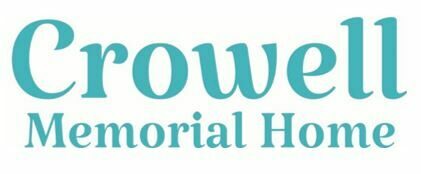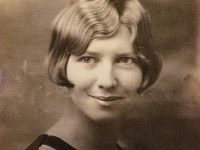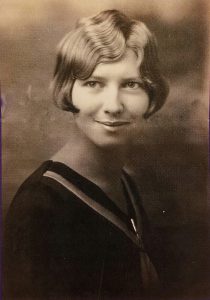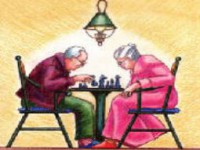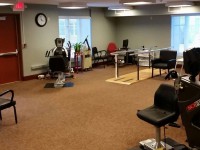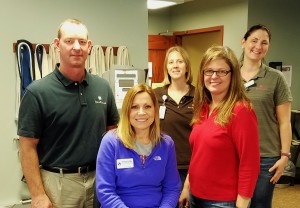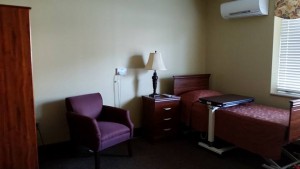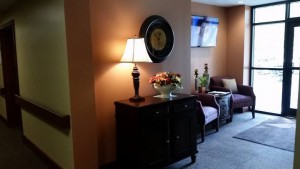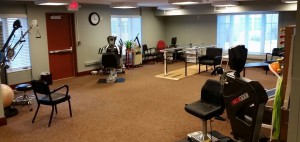Rewind: “At Home” 2004-2005
The following article appeared in the Fall 2004 & Winter 2005 editions of “At Home”, a periodical publication of Crowell Memorial Home & Crowell Memorial Home Foundation.
Alice Kruse: A life filled with the Love of God, Education and Service
For the sheer joy of it, Alice Kruse loved to run when she was a child, to read and to study throughout her life and to teach until she retired in 1973. During her 43 year teaching career, she taught almost every elementary grade, high school and college.
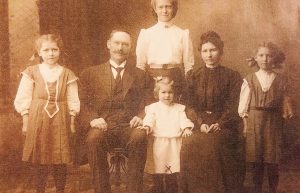
Closely Knit Family
Alice was born near Clay Center in south central Nebraska in 1907. Her closely knit family was deeply religious and their social life centered on their church and rural school district.
Alice recalled when the weather wouldn’t allow them to drive horse and carriage to town, they would have a service at home.
“We had lots of music; my oldest sister played the piano and all our family sang hymns from the seven copies of Joy to the World my father had purchased for our group singing.”
When she was a child, Alice said, two young Sunday School missionaries would frequently stop at their home. “It was a joyful evening of signing and hearing “outside news.
The missionaries always left with a check from her father to help in their work,” Alice stated.
Loved School
Alice’s formal education began in Clay Center’s East Lynn District school when she was five. She loved school and said she remembers with great affection her eighth grade teacher who helped her to become more confident and urged her to become more aggressive in using her natural gifts.
When Alice was ready for high school, the family moved into a large home at the edge of town because education was very important and getting to school in inclement weather was difficult. Children in her family were expected to do their lessons during school hours and family work while at home.
Alice was active in the youth organization at church and in 4-H during the summer where she focused on sewing.
Carnegie Town Library/Gym
Alice noted that during her teen years in Clay Center, as was true in many small towns throughout the country, the National Andrew Carnegie Foundation offered to pay half the cost of a town library. The town was to assume the cost of the other half with the understanding that the town could use its “half” however it choose. Clay Center decided to have a gymnasium, which served as the high school gym for many years, even though the two buildings were several blocks apart. There Alice saw her first basketball game. She longed to play, but Midwest high school sports for girls were many years in the future.
A Provisional Teaching Certificate at 17
Alice’s high school years were full. The “country” kids had to prove they could compete with the “town” kids. She completed the college preparatory program and squeezed in enough extra courses to qualify to take the 18 state examinations to become a rural teacher. “I passed and so, at barely 17 years old, I received a provisional rural teaching certificate. The annual Junior-Senior banquet was special to me because I was asked to give one of the speeches. After graduating with honors, I taught in a nearby rural school for one year.”
The Best was Yet to Come!
“The best was yet to come!” For several summers, with her family, Alice had experienced week long church camps. They lived in a tent, cooked on a small stove brought from home, slept on straw-filled ticking mattresses, listened to sermons in the mornings and afternoons, attended evening ‘altar calls,’ and sang lots of hymns –old and new. “Best of all,” Alice recalled, “was hearing advertisements for the Methodist church colleges which were supplemented by the bulletin boards of photos of college students and their activities. I didn’t miss any of it!” As a result, in the fall of 1926, she enrolled at Western Union College in LeMars, Iowa.
(The story continues in Alice’s own words, which are italicized)
"After a year of teaching in a rural Nebraska school and four wonderful and rewarding years of college where I majored in English and Speech, I was eager to begin a new career. Red Bird Mission, built and owned by the United Methodist Church, was located in the Appalachian Mountains 20 miles from Pineville, Kentucky. To get to this settlement in 1929, I rode a small service train with one antique passenger car for five miles into the mountains. Then a school boy from the settlement met us with mounts. Mine was a mule named Wagon Kate. My two suitcases were carried in gunny sacks fastened together with long nails to the back of the saddle. The boy jumped on the back of his mount and we were ready for our 14 mile trip to the settlement. 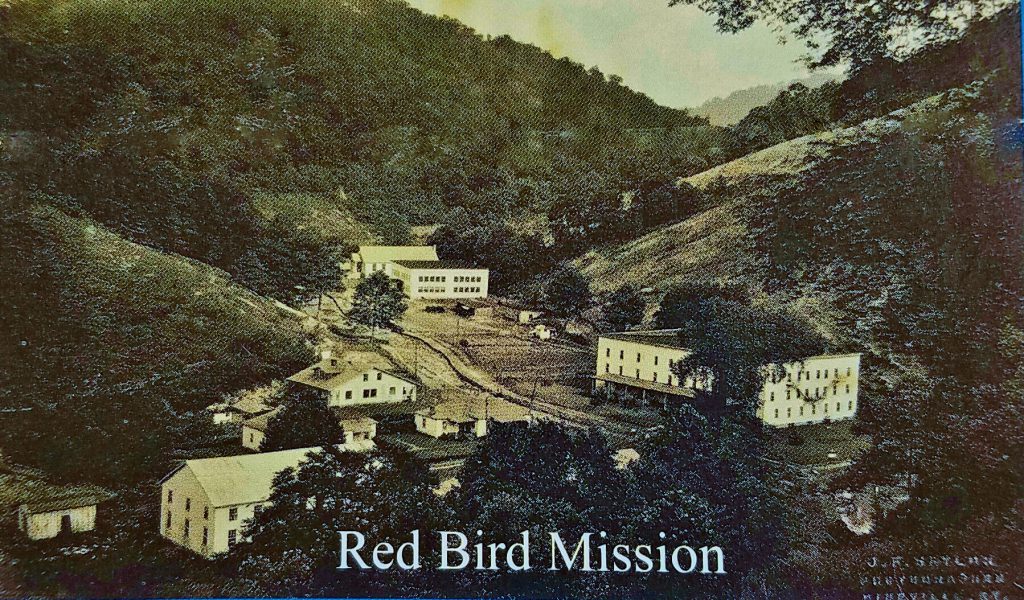
No Running Water
Upon arriving, I was given a room in the large girls’ dormitory which was to be my home for the next 16 years. At the beginning, there was no running water (except in the nearby creek,) no indoor toilets, no electric fans to help cope with the humid, hot summers where the temperature was often in the 100’s and no amenities to which I had been previously accustomed.
Children are Amazingly Alike
Children and youth throughout the world are amazingly alike: self-centered, curious, eager to explore and amazingly quick to learn how to get attention. Mountain children were often short changed in the small grade schools scattered throughout the mountains. It was therefore a big challenge for us at the Red Bird Mission to help our students catch up. Most of them responded beautifully. We initiated Saturday night programs and encouraged adults in our community to attend. Our school principal’s role was to be in the audience and help keep order. The role of the other two high school faculty members was to provide the program. Developing musical talent in high school students became the responsibility of the social science and history teacher while mine was to work with students interested in speech. Many a Saturday night program consisted of choosing a general topic with students speaking on some aspect of that topic.
Qualified for State
I also coached debate. This was all done during after school hours. After the first few years, we entered speech contests with other schools. I was so proud of our students when one year we qualified to go to the State Debate Tournament. We were later defeated in the finals by Lexington, the largest high school in the state. Our students did win two first place awards.
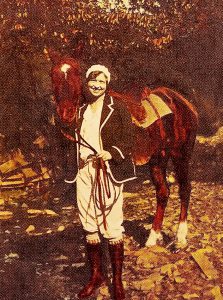 Each staff member at the mission received one month of vacation a year. I established a pattern of alternating years by coming back to Nebraska, with my parents’ home as headquarters, while I traveled to various churches and clubs in the area to speak of my experiences. Alternate summers, I enrolled in the state university, pursuing a higher degree. Both types of summer activities were costly, because as a mission school teacher, I received just $40 per month, out of which came $10 for meals served in the main dining room where teachers and students ate.
Each staff member at the mission received one month of vacation a year. I established a pattern of alternating years by coming back to Nebraska, with my parents’ home as headquarters, while I traveled to various churches and clubs in the area to speak of my experiences. Alternate summers, I enrolled in the state university, pursuing a higher degree. Both types of summer activities were costly, because as a mission school teacher, I received just $40 per month, out of which came $10 for meals served in the main dining room where teachers and students ate.
Water Heated Over Open Fire
During summer time spent at Red Bird, teachers worked together cleaning all classrooms and the church buildings. Water for this big job was heated in a large boiler over an outdoor open fire. Any remaining summer time was spent visiting homes up and down the creek.
The 1943, I had my master’s degree from the University of Kentucky. I then began taking additional course at other universities during my summer vacations.
World Was Changing
The world was changing. Many of the mountain men who served in World War II chose not to return to the area. With the G.I. Bill, large numbers of veterans decided to attend college and graduate school. Colleges across the country were competing for teachers.
In 1946, I decided to leave the mission school and accept a teaching position at Western Union College (later to be known as Westmar College) in LeMars, Iowa. The college was related to the United Methodist Church and attending daily Chapel services was required. Teaching college English and speech and coaching debate became a happy and challenging experience for me. Part of the challenge was my self-imposed goal of learning the names of my more than 100 students within two weeks.
Wanting to learn about the students’ out-of-class activities, I attended nearly all home football and basketball games and wrestling matches. I also enjoyed attending musical events. I sponsored the national English fraternity, Sigma Tau Delta, and was faculty sponsor for the student newspaper.
I was a member of several national fraternities including Sigma Tau Delta, Pi Kappa Delta and the American Association of University professors.
In 1953, I was surprised the Westmar community by buying a home near the campus and becoming a weekend backyard gardener."
(End of narration)
Rewards and Responsibility
The passing years brought Alice rewards and responsibilities. She became head of the English department and Director of Humanities. In addition, she was awarded the “Iowa Arts Award” for poetry she had written and the “Service to Mankind” award from the Sertoma Club. Westmar College awarded Alice the “Distinguished Alumna,” the “Legion of Heritage” and the “Outstanding Educators of America” awards. She was most appreciative of being recognized for singing in her church choir for 50 years. [Alice still beautifully sings a solo each year at the Crowell Home Christmas Pageant!]
In 1973, after 27 years at Westmar, Alice retired from teaching. This did not mean, however, retiring from Westmar. She enjoyed the next 20 years doing volunteer work for the college.
Scholarships
Alice, always thrifty, saved her money because she was dedicated to establishing scholarships for deserving, needy students. She began endowing scholarships at Red Bird and continued doing so, generously, for students at Westmar and students attending UMC St. Paul Theological Seminary. She gave these with the stipulation that the recipient must be a “true student… studious… first a student then alert to other opportunities on campus.” She also endowed Iowa Church Foundation Scholarships.
Nebraska Methodist Foundation
However, it was not only the students of Red Bird and Westmar College who benefited from her generosity. In 1993, through the Nebraska United Methodist Foundation, she bestowed $100,000 in honor of her father. This was to ensure the development of new United Methodist congregations.
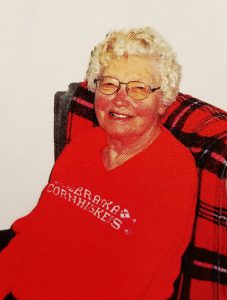 Alice Kruse is now an alert and active Assisted Living resident of Crowell Memorial Home. She regularly attends Chapel services, as well as other activities. She was a winner in the Crowell Home “Decathlon” and thoroughly enjoys a challenging game of “Wheel of Fortune.” Alice loves to read and stated she is grateful to Crowell Home and the Blair Public Library for supplying he with large print books.
Alice Kruse is now an alert and active Assisted Living resident of Crowell Memorial Home. She regularly attends Chapel services, as well as other activities. She was a winner in the Crowell Home “Decathlon” and thoroughly enjoys a challenging game of “Wheel of Fortune.” Alice loves to read and stated she is grateful to Crowell Home and the Blair Public Library for supplying he with large print books.
Alice has lived nearly 100 years following her ‘calling’ by teaching, giving, serving God and throughout, enjoying each phase of her full and rewarding life.
2016 Update:
Alice was a treasured resident of Crowell Home for many years. She often walked the halls to visit others and for exercise. She always greeted others with a kind, gentle smile. The kindness of her spirit was evident in her demeanor. She returned to her beloved Savior in 2010. She is remembered fondly by all who knew and cared for her.
From The Lincoln Journal Star:
“Alice M. Kruse, of Blair, Neb., died on Friday (1/15/10). Alice was born March 2, 1907, to John and Martha Kruse, near Clay Center, Nebraska. Alice taught at the Red Bird Mission near Pineville, Kentucky from 1930 to 1946. In 1946 Alice joined the faculty of Westmar College, serving as Head of the English Department and Director of the Humanities Division. Following her retirement from Westmar in 1973, Alice continued to actively support Westmar and its students. Alice lived simply, as evidenced by her never owning an automobile, but she gave much.
Alice was preceded in death by four sisters and one brother, and she is survived by eight nieces and nephews.
A Service of Memory will be held at the Crowell Memorial Home, 245 South 22nd Street, Blair, Nebraska, at 2:30 p.m. on Sunday (1/24/10). In keeping with her lifelong philosophy of giving, Alice donated her body to the University of Nebraska College of Medicine. Memorials may be sent to the Alice Kruse Seminary Scholarship Fund, The Nebraska United Methodist Foundation, 100 W. Fletcher Ave., Suite 100, Lincoln, Nebraska 68521.”
